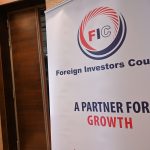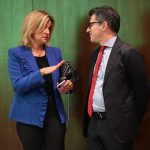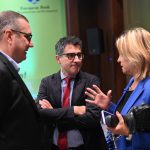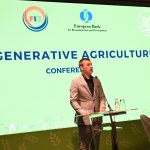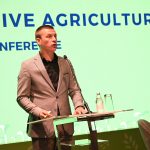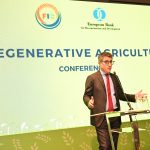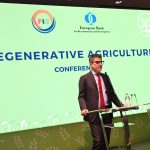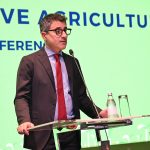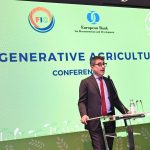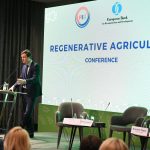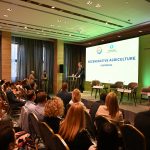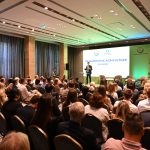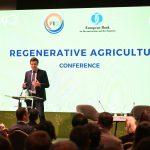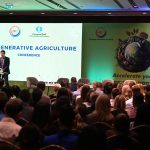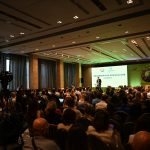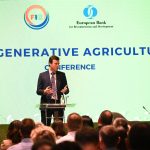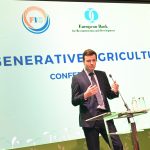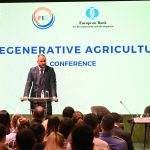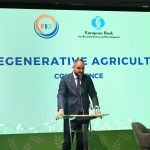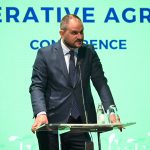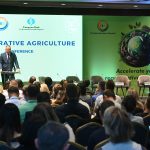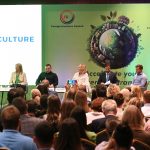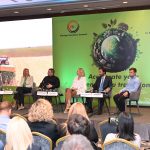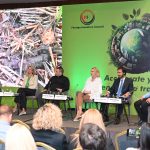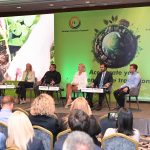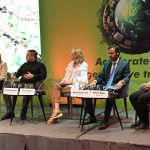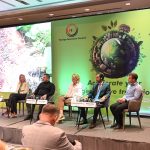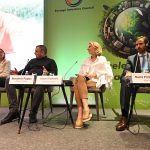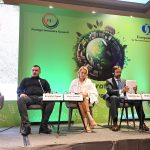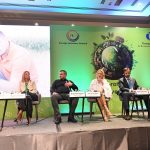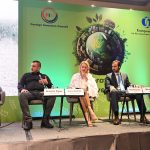On September 27, FIC in cooperation with EBRD organized the first Regenerative Agriculture Conference: Accelerate Your Regenerative Transition, to emphasize the significance and raise public awareness of the importance of regenerative agriculture and its innovative approach, which is focused on restoring and preserving natural resources, while simultaneously increasing the productivity of agricultural production. The concept of regenerative agriculture is essential in strengthening resistance to evident climate changes, preserving biodiversity and the environment, and ensuring sustainable food production for future generations.
The aim of this Conference, attended by over 160 participants, was to enable the exchange of ideas, the establishment of new partnerships, and the creation of a network of experts who share the same vision on the sustainable future of agriculture and food production.
In his introductory address, FIC BoD member and EBRD Regional Director for the Western Balkans Matteo Colagneli emphasized: “‘We are pleased to join forces with FIC on raising awareness on regenerative agriculture, an important topic in terms of sustainable food production and climate change mitigation, but also an opportunity for Serbian farmers to integrate in international value chains. Agribusiness is a key priority for EBRD in Serbia. We will continue financing the private sector but also the critical irrigation infrastructure needed to strengthen the competitiveness and climate change resilience of Serbia’s agriculture”.
Thomas Bouriot, EBRD principal in charge of defining the strategy and implementation of climate policy, stated that the adoption of regenerative agricultural practices that maintain and enhance soil health, promote resource efficiency and stronger resilience to climate change is a key lever to meet the challenges of the food sector in the 21st century. In addition, he pointed out that the European Union has committed to ambitious objectives on sustainable food production under the EU Climate law and via its Farm to Fork strategy that will impact not only food production within the European Union but also in countries exporting to the EU market. “The financial sector, including the EBRD is increasingly factoring the impact of climate change and environmental degradation and the fast-evolving regulatory environment in its decisions for capital allocation. New financial instruments are also emerging to support the transition towards sustainable agriculture, including via blended finance and carbon finance”, emphasized Mr. Bouriot.
FAO UN expert Sandra Corsi noticed that we need to foster public-private collaboration to ensure that sustainability is market-driven and economically viable. “It is important to remind us that we are the last generation that can secure the future of agriculture, which is a challenging task but also an unprecedented opportunity”, concluded Ms. Corsi.
State Secretary in the Ministry of Agriculture, Forestry and Water Management Bojan Vranjković said that regenerative agriculture is not just a passing trend; it is a movement that can shape the future of agriculture in Serbia and around the world, adding that the Government of the Republic of Serbia will continue to invest significant efforts in ensuring sustainable agricultural practices in Serbia.
Introductory speeches were followed by regenerative agriculture movie and a panel discussion, which, in addition to regenerative agriculture itself, included the experiences of European and Serbian farmers and the announced changes in European regulations. Besides, the discussion opened up numerous issues, such as global companies’ investment policies regarding the preservation of healthy soil, water management, and waste recycling to reduce CO2 emissions, but also how the need for sustainable business has influenced the choice of products, supply chain management and the operation of the retail chain, i.e., cooperation with local farmers and why it is essential to support local producers in terms of sustainable model development.
The moderator of the panel was Goran Eror, Journalist and Editor of Agrodnevnik on RTV, while the participants were Mrs. Marjana Davidović, Country Manager Adriatic South Hub (Serbia, Montenegro, North Macedonia), Nestlé Adriatic S; Mrs. Jelena Pavlović, Vice President for Legal Affairs, Quality & Product Integrity, Corporate Communications, Asset Protection and Sustainability, Delhaize Serbia; Mr. Nuno Pinto Leite, General Manager, South-Central Europe and Baltics, PepsiCo; Mr. Marko Bojin, B.Sc. Ing of Agriculture, Organizer of Agricultural Production of the company Geneza; and Mr. Branimir Popov, an expert in regenerative agriculture and agribusiness, CEO of Prime Trinity.
📸 credit by CorD Magazine





